9 Small Business Inventory Management Software
In the bustling arena of small business management, inventory often takes center stage. Why? Because it's the backbone that drives sales, affects cash flow, and plays a pivotal role in customer satisfaction.
But here’s the twist: Managing inventory isn't just about numbers and spreadsheets. It’s about leveraging smart technology to gain an edge.
Enter Inventory Management Software—your secret weapon for real-time tracking, data-driven decision-making, and seamless supply chain management.
When equipped with advanced features and an intuitive interface, these software solutions transform inventory management from a laborious task into a strategic asset.
Keep reading to check what you should consider while choosing inventory software.
1. ZarMoney

ZarMoney is a cloud-based inventory management software providing the best management tools for small businesses. The inventory helps you in the management of warehouses. Cloud technology allows for flexible monitoring of your operations.
The split-view feature allows you to view warehouses by location to analyze product status. ZarMoney gives access to all your data in one place, no matter where you are. You can view your inventory counts, individual items, and purchase histories. ZarMoney gives you a global view to manage your inventory cost-effectively.
The instantaneous availability of information gives real-time inventory control. You can use this information to make up-to-date decisions and make timely resolutions.
Features
- Real-time Inventory Tracking
- Barcode Scanning
- Multi-Warehouse Management
- Low-Stock Alerts
- Supply Chain Management
- Advanced Inventory Features
- Inventory Reports
- Unlimited Locations
- Additional Features for Accounting Software Integration
- Unlimited Users
Top 3 Features of ZarMoney
1. Real-Time Inventory Tracking

ZarMoney provides real-time inventory tracking that helps business owners make data-driven decisions on the fly. This feature is crucial for managing stock levels effectively and avoiding both overstock and understock situations. Real-time insights also assist in inventory planning and enhancing customer satisfaction.
2. Multi-Warehouse Management
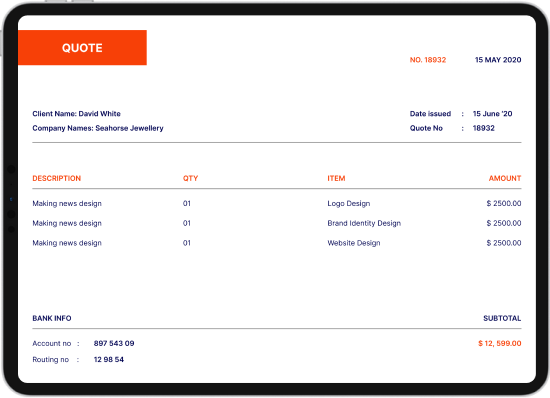
As your business grows, so do your storage needs. ZarMoney accommodates this through its multi-warehouse management feature. It’s particularly beneficial for wholesale businesses with more than one storage location. It allows for seamless coordination between various warehouse management systems, improving your supply chain management2.
3. Low-Stock Alerts
Avoid the pitfall of running out of key inventory items with ZarMoney’s low-stock alerts feature. This functionality sends immediate notifications to business owners when stock levels reach a predetermined threshold. It not only ensures seamless business operations but also significantly improves your supply chain efficiency.
Pros
- Advanced systems provide comprehensive inventory management features.
- User-friendly interface helps business owners in efficient management.
- Real-time tracking enhances informed decisions.
- Supports unlimited locations and users, making it scalable.
- Robust accounting software integrations streamline business operations.
Cons
- Expensive plan options may not suit all business sizes.
- Limited customer support options.
- Learning curve for advanced features.
- Occasional glitches can disrupt real-time tracking.
- Lacks detailed reports in basic plans.
Pricing
- Entrepreneur: $15 per month
- Small Business: $20 per month
- Enterprise: $350 per month
Conclusion
ZarMoney is a robust inventory control software designed for scalability. Its advanced features and real-time capabilities make it a top choice for growing businesses. However, the pricing and learning curve could be barriers for some.
2. Zoho Inventory

Zoho Inventory’s advanced inventory management features for small business offers stock-keeping units (SKUs). It is customizable to different business types, offering an intuitive interface. Zoho also provides features for managing perishable items, like alerts and expiration monitoring.
You will get more advanced features if you choose to upgrade your plan. You can manage many warehouses and avail batch tracking and serial number tracking. Third-party integration will allow you to connect with Amazon and its Fulfilled By Amazon (FBA) service.
The Elite plan of Zoho offers unlimited orders, shipping labels, and tracking. The plan provides five Shopify stores and 15 warehouses. This proves helpful if your business involves shipping and eCommerce.
Features
- Real-Time Inventory Management
- Barcode Scanning
- Serial Number Tracking
- Inventory Forecasting
- Multi-Channel Selling
- Excess Inventory Management
- Advanced Inventory Features
- Payment Gateways Integration
- Inventory Reports
- Cloud-Based Inventory Management Software
Top 3 Features of Zoho
1. Real-Time Inventory Management
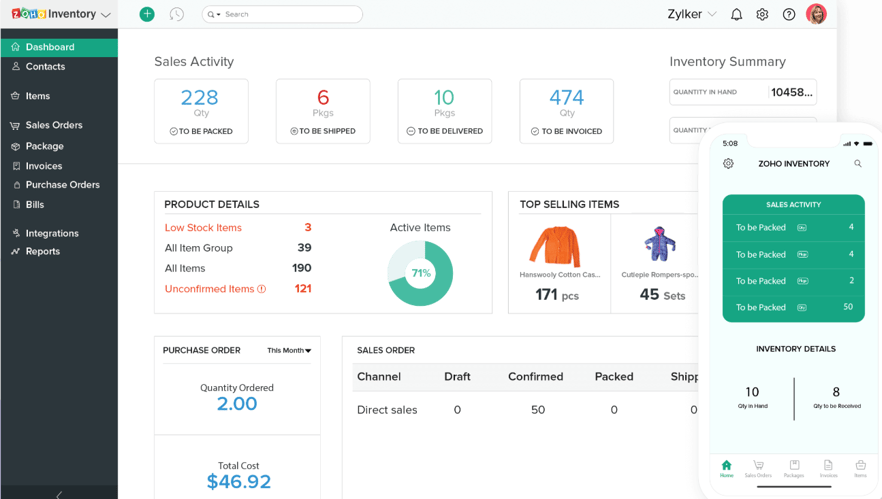
Real-time inventory management allows business owners to track inventory levels accurately. This feature ensures you have up-to-date information to make informed decisions, helping to improve customer satisfaction and manage inventory costs effectively.
2. Barcode Scanning
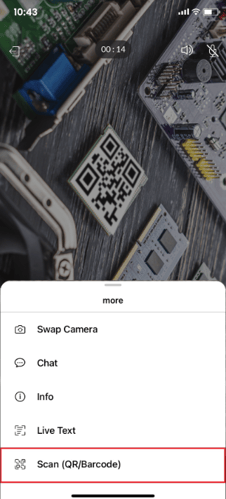
Zoho Inventory supports barcode scanning, a crucial feature for retail and eCommerce businesses. This function allows for quick and efficient tracking of inventory items, thereby reducing errors and improving inventory control. The ease of scanning also enables faster checkout processes and stock updates.
3. Advanced Inventory Features
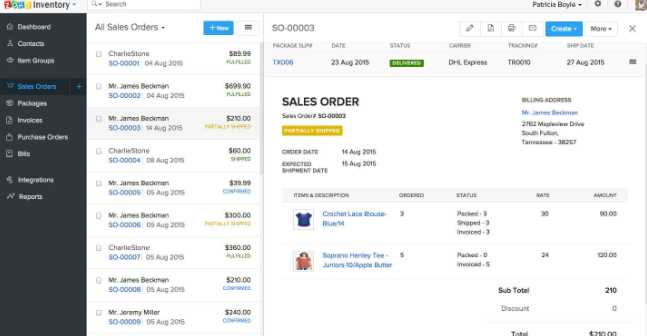
Zoho Inventory doesn't just stop at basic tracking. It offers advanced features like inventory forecasting, which are valuable tools for planning your business. These advanced features enable you to predict future inventory levels and make data-driven decisions that can save you money and improve efficiency.
Pros
- Cloud-based inventory management software ensures accessibility from anywhere.
- Advanced inventory features support complex business operations.
- User-friendly, intuitive interface streamlines inventory processes.
- Excellent customer support options enhance user experience.
- Advanced plans offer a wide range of additional features, including accounting systems integration.
Cons
- Limited features in basic inventory management software plans.
- Requires multiple Zoho apps for complete business management.
- Monthly plans can become expensive for larger teams.
- Not well-suited for businesses without reliable internet access.
- Limited multi-warehouse management options in basic plans.
Pricing
- Zoho offers a free option if you are getting started
- It provides a two-week free trial for its other plans, starting at $59/month when billed monthly
- Premium: $159 per month
- Elite $239 per month
Conclusion
Zoho Inventory is a cloud-based inventory software solution that offers a wide range of features to streamline your business. Although it requires an internet connection and may necessitate multiple Zoho apps, its advanced features and robust customer support make it a strong choice.
3. inFlow Inventory

If your business has a low budget, inFlow inventory may be your best option. The inFlow On-Premise is one of the best free inventory management plans available in the market.
inFlow is incredibly easy to use, with many of its options fully automated. It even has a mobile app that scans barcodes and keeps your sales agent and inventory manager on the same page. The platform is flexible and works with Android, iOS, and Windows.
inFlow combines inventory and order management software to optimize inventory tracking software. It is made for retail businesses with multi-channel selling requirements. A distinct feature of inFlow inventory is the built-in B2B portal.
Sales, reorder management, and purchases are operated through B2B portals. It offers to bill invoices, materials, and other receipts. The process is carried out with punctual order procurement, delivery, and shipping.
The inventory control software can be integrated with Amazon, Shopify, Zapier, and Quickbooks. Window backups and 256-bit SSL security secure the software. inFlow supports personalized online onboarding demos and helps every step of the way.
Features
- Inventory Management Systems
- Barcode Scanning
- Real-Time Inventory Tracking
- Inventory Reports
- Expiration Dates Tracking
- Multi-Channel Selling
- Stock Alerts
- Payment Processing
- Accounting Integrations
- Additional Features for Warehouse Management
Top 3 Features of InFlow
1. Barcode Scanning
One of InFlow Inventory's key features is its barcode scanning capability. For small businesses, this means efficient tracking of inventory items, minimizing errors and expediting the stock-taking process.
2. Batch and Serial Number Tracking
This feature enables small businesses to track items based on batches or serial numbers, which is invaluable for quality control and warranty claims.
3. Multiple Locations Support
InFlow Inventory allows small business owners to manage inventory across multiple locations. Stock levels are updated in real-time, allowing for better supply chain management.
Pros
- InFlow Inventory offers a broad range of inventory management tools tailored for small businesses.
- Seamless accounting integrations ensure streamlined business operations.
- Real-time inventory tracking enables informed decisions.
- Flexible stock alerts help in maintaining optimal inventory levels.
- Additional features for warehouse management offer a comprehensive solution.
Cons
- Limited customer support options can hinder problem resolution.
- The Professional Plan may be too expensive for some business owners.
- Lack of some advanced systems needed by larger businesses.
- May require additional software for complete supply chain management.
- Some inventory management features are locked behind expensive plans.
Pricing
- 14-Day Free Trial
- Contact for quote
Conclusion
InFlow Inventory is a versatile Inventory Management Software that offers robust features suitable for a variety of business sizes. Despite some limitations in customer support and advanced features, it's an excellent starting point for small businesses.
4. Ordoro Inventory

It is challenging to practice good inventory controls when administering multiple sales channels. Ordoro makes multichannel selling easier. You can produce master products within your inventory system. This allows you to update your channels' images, branding, and descriptions.
The inventory offers vendor management features that make dropshipping easier. You can assign vendors to particular products in your catalog. Ordoro sends the order to the relevant vendor when a customer orders these items. This cuts out the middleman, ensuring customers get their items quickly.
Ordoro makes non-conventional inventory management strategies possible. You can choose to oversell your goods or limit in-stock items visible to customers. Buyers will complete their purchase. This helps you turn a better profit.
Features
- Inventory Management Systems
- Barcode Scanning
- Multi-Warehouse Management
- Real-Time Inventory Tracking
- Inventory Reports
- Low-Stock Alerts
- Accounting Software Integration
- Inventory Forecasting
- Dropshipping Support
- Additional Features for Supply Chain Management
Top 3 Features of Ordoro
1. Multi-Warehouse Management
Odoro Inventory excels in managing multiple warehouse locations. This feature allows business owners to scale their operations smoothly. From real-time tracking to detailed reports, multi-warehouse management ensures that you have complete control over your inventory, regardless of where it's stored.
2. Low-Stock Alerts
Stock levels are crucial for any business. Ordoro Inventory offers low-stock alerts to prevent running out of essential items. By receiving timely notifications, business owners can make informed decisions to replenish inventory, thus ensuring uninterrupted business operations.
3. Inventory Forecasting
Planning is crucial for any small business owner. With Ordoro's inventory forecasting feature, you can predict future demand for your products. This enables you to prepare adequately, reducing both excess inventory and the risk of understocking, thereby optimizing inventory costs.
Pros
- Robust inventory management tools make it a complete solution for small businesses.
- Supports multi-warehouse management, allowing for scalability.
- Real-time inventory tracking enhances business operations.
- Additional features for supply chain management provide a holistic approach.
- Advanced inventory features like forecasting make it more than just a basic inventory software.
Cons
- Could be overwhelming for business owners new to inventory systems.
- More expensive monthly plans for advanced features.
- Requires additional payment gateways for some international currencies.
- Limited customer support options on weekends.
- High learning curve for some advanced systems.
Pricing
- Ordoro includes a free trial
- Advanced Plan: $59 per month
- Premium: $159 per month
Conclusion
Ordoro Inventory offers an all-in-one inventory management software solution. Its robust features and multi-warehouse support make it suitable for growing businesses. However, the cost and complexity may not suit everyone.
5. Cin7 Inventory

Cin7 Inventory is an inventory management software and a point-of-sale system. This allows you to optimize stock management across sales channels to avoid any stock-out.
Cin7 breaks this cycle by offering built-in modules that come standard with your plan. Along with the POS system, Cin7 has all the options of B2B eCommerce features, manufacturing features, and a payment portal.
The advanced reporting of Cin7 allows you to access over a hundred customizable reports. It includes forecasting features and demand planning. This provides you with actionable data to make better decisions around inventory.
Cin7 has many integrations across accounting, eCommerce, and more. The point-of-sale module can run on mobile devices and take offline orders. It makes it easy to take your business to the next level.
Features
- Real-Time Inventory Tracking
- Barcode Scanning
- Inventory Reports
- Multi-Channel Selling
- Cloud-Based Inventory Management Software
- Inventory Forecasting
- Wholesale Business Support
- Accounting Software Integration
- Payment Gateways
- Supply Chain Management
Top 3 Features of Cin7
1. Integrated Point of Sale (POS)
Cin7 offers an integrated POS system, a crucial feature for small retail businesses. It enables real-time inventory tracking and helps manage sales both online and offline.
2. Inventory Forecasting
This advanced feature allows business owners to forecast demand based on historical data, thereby optimizing stock levels and reducing excess inventory.
3. Direct EDI
Cin7's Direct EDI feature enables the seamless transfer of documents like purchase orders and invoices between retailers and suppliers, which is particularly useful for small wholesale businesses.
Pros
- Real-time inventory tracking enables informed decisions and efficient operations.
- Support for both wholesale businesses and multi-channel selling.
- Highly scalable, thanks to its cloud-based inventory management software.
- Numerous accounting software and payment gateways integrations.
- Comprehensive inventory reports provide valuable insights for business owners.
Cons
- The interface may not be intuitive for all users.
- Some advanced inventory features are only available in expensive plans.
- Customer support options may be limited during non-business hours.
- The feature-rich environment may be overwhelming for some business owners.
- Expensive plan options may deter small businesses on a tight budget.
Pricing
- Offers free trial
- Pricing plan starts at $325 per month
Conclusion
Cin7 Inventory is an all-in-one, cloud-based inventory management software ideal for small businesses looking to scale. Though it offers a wide range of features, its complexity and cost could be barriers for some.
6. LightSpeed

LightSpeed provides an effective inventory solution for the needs of small-scale restaurants. The platform focuses on expiration date tracking and supply chain needs.
You can run your POS services, online ordering, and workforce management across multiple locations.
The platform provides tools that make it easier to run your restaurant. You can use LightSpeed software to create recipes for the dishes you sell, customizing the recipe with precise ingredients.
LightSpeed automatically deducts those quantities from your inventory levels when you sell a dish. You can also use this feature to evaluate pricing for your menu items.
Features
- Real-Time Inventory Tracking
- Payment Processing
- Inventory Reports
- Low-Stock Alerts
- Additional Features for Supply Chain Management
- Barcode Scanning
- Accounting Software Integration
- Cloud-Based Inventory Management Software
- Inventory Forecasting
- Multi-Channel Selling
Top 3 Features of LightSpeed
1. Real-Time Inventory Tracking
LightSpeed's real-time inventory tracking feature is invaluable for small business owners. Having access to real-time data enables you to make informed decisions, optimize stock levels, and ultimately increase customer satisfaction. This is a must-have feature for any small business looking to improve their inventory management systems.
2. Low-Stock Alerts
Low-stock alerts are crucial for maintaining balanced inventory levels. LightSpeed's advanced system notifies business owners when items are about to run out. This feature is particularly useful for avoiding both stockouts and excess inventory, contributing to a more efficient operation.
3. Additional Features for Supply Chain Management
Understanding your supply chain is essential for business growth. LightSpeed offers additional features that assist in supply chain management. This enables business owners to better plan their inventory processes and make data-driven decisions, thereby streamlining the overall operation.
Pros
- Real-time inventory tracking keeps business owners informed of stock levels.
- Additional features for supply chain management offer a comprehensive solution.
- Accounting software integration streamlines financial operations.
- Robust low-stock alerts system enhances inventory control.
- Cloud-based software ensures accessibility from various locations.
Cons
- Some advanced inventory features may require a steep learning curve.
- Expensive plan options might not be affordable for every small business.
- Limited customer support options outside of standard business hours.
- Accounting integrations may not cover all accounting systems.
- Additional payment for advanced features can increase inventory costs.
Pricing
- You can start a business using LightSpeed at $69 per month
- The premium plan goes to $399 per month.
Conclusion
UpServe, now known as LightSpeed, offers a cloud-based inventory management software solution with robust features. While it’s a comprehensive choice, small businesses may find some plans expensive and some features overwhelming.
7. BrightPearl

Brightpearl is an inventory system and retail management system built for retail businesses. It is created particularly for higher transaction volumes. You can optimize inventory management, order management, fulfillment, warehousing, purchasing, accounting, and more. It is the only inventory you need to automate and streamline your business.
The automation engine automates laborious tasks across your sales channels. From order fulfillment to inventory management, the software increases your business productivity. You can process more orders without extra staff. Automation removes human errors, and the work is completed in less time.
Brightpearl automates post-purchase operations, giving accurate customer demand for informed purchasing decisions. This results in no missed sales or too much cash in the unsold inventory.
The advanced reporting of Brightpearl helps you dive deeper into data crucial to your brand. You can get information about profitable sales channels and target market campaigns.
BrightPearl's retail operating system presents a suite of plug-and-play integrations. It also has a deep API and certified partner network.
The retail-back office experts are at your side every step. From implementation to onboarding training, you can enjoy 24/7 support.
Features
- Inventory Management Systems
- Real-Time Inventory Tracking
- Barcode Scanning
- Advanced Inventory Features
- Multi-Channel Selling
- Accounting Software Integration
- Inventory Reports
- Low-Stock Alerts
- Payment Gateways
- Supply Chain Management
Top 3 Features of BrightPearl
1. Automated Workflows
BrightPearl offers automated workflows that streamline various inventory processes. These are especially beneficial for small business owners looking to save time and minimize manual errors. The automation can range from order processing to updating stock levels in real-time, allowing you to focus on other aspects of your business.
2. Customer Relationship Management (CRM)
This feature allows businesses to keep track of customer interactions and transactions. For small business owners, a CRM is crucial for understanding customer behavior and preferences, enabling them to make informed marketing and inventory planning decisions.
3. Order Management
BrightPearl’s order management feature provides a consolidated view of orders from multiple channels. It integrates seamlessly with popular eCommerce platforms, making it easier for small business owners to manage orders without switching between different systems.
Pros
- Comprehensive inventory management features suitable for both eCommerce and wholesale businesses.
- Real-time inventory tracking allows business owners to make informed decisions.
- Low-stock alerts for maintaining optimal inventory levels.
- A variety of payment gateways and accounting software integrations.
- Supply chain management features for a holistic business approach.
Cons
- May require a steep learning curve for those unfamiliar with advanced inventory systems.
- Limited customer support options can hinder timely issue resolution.
- Advanced features may be locked behind more expensive plans.
- Some business operations may require third-party integrations.
- Customer satisfaction could be impacted due to occasional software glitches.
Pricing
- No free plan
- Quote for price
Conclusion
BrightPearl is a robust Inventory Management Software that offers advanced features designed for small businesses in both eCommerce and wholesale sectors. Its range of functionalities makes it a strong contender, although its learning curve and pricing could be drawbacks for some.
8. Netsuite
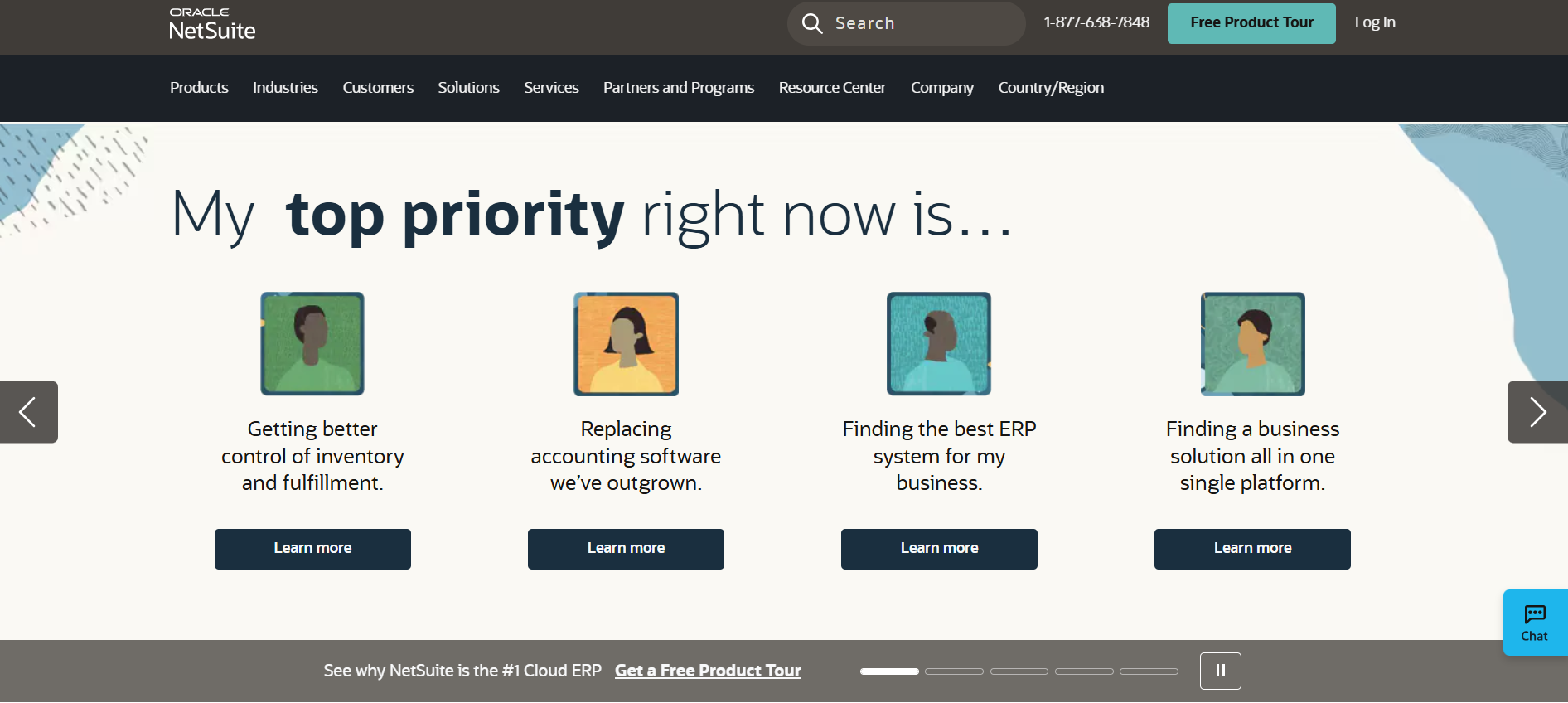
Owned by Oracle, Netsuite is one of the best inventory management software for small businesses. The platform provides a complete set of basic inventory management features. It also includes purchasing capabilities to optimize the supply chain and manufacturing processes.
As a small business, you need a cost-effective, agile, easy-to-use solution that leads to long-term innovation. The inventory software is very customizable and gives advanced features. The advanced features include cycle counts, demand planning, and detailed product catalogs.
Features
- Inventory Management Systems
- Real-Time Inventory Tracking
- Barcode Scanning
- Multi-Warehouse Management
- Advanced Inventory Features
- Inventory Reports
- Accounting Software Integration
- Payment Gateways
- Low-Stock Alerts
- Supply Chain Management
Top 3 Features of NetSuite
1. Cloud-Based Financials
With NetSuite, you're getting a cloud-based financial management system that integrates seamlessly with inventory, CRM, and eCommerce. As a small business owner, this unification is pivotal for making data-driven decisions, from tracking real-time inventory to evaluating customer interaction.
2. Multi-Currency Support
NetSuite offers multi-currency support, crucial for small businesses that operate globally. This feature takes care of currency conversion and financial compliance, thus simplifying international transactions.
3. Customizable Dashboards
Customizable dashboards offer real-time insights into various business operations, including inventory levels and supply chain management. Small business owners can personalize these dashboards to view the KPIs most relevant to them, enabling informed decision-making.
Pros
- Comprehensive, advanced inventory features suitable for a variety of business sizes.
- Real-time inventory tracking aids in making data-driven decisions.
- Multiple accounting software and payment gateways integrations streamline financials.
- Robust low-stock alerts system enhances inventory control.
- Multi-warehouse management for scalable operations.
Cons
- The extensive range of features may overwhelm some business owners.
- Customer support options can be limited, affecting issue resolution.
- Advanced systems and features may require a steep learning curve.
- Some key features are only available in more expensive plans.
- Third-party integrations may require additional expenses.
Pricing
- The platform offers no free trial or free accounts
- You have to ask Netsuite for a custom quote
- The pricing of the software starts at $999/month
Conclusion
NetSuite offers a robust, scalable Inventory Management Software suitable for businesses that are planning to expand. Its wide range of advanced features is a boon, but the learning curve and potential cost may deter some.
9. Agiliron
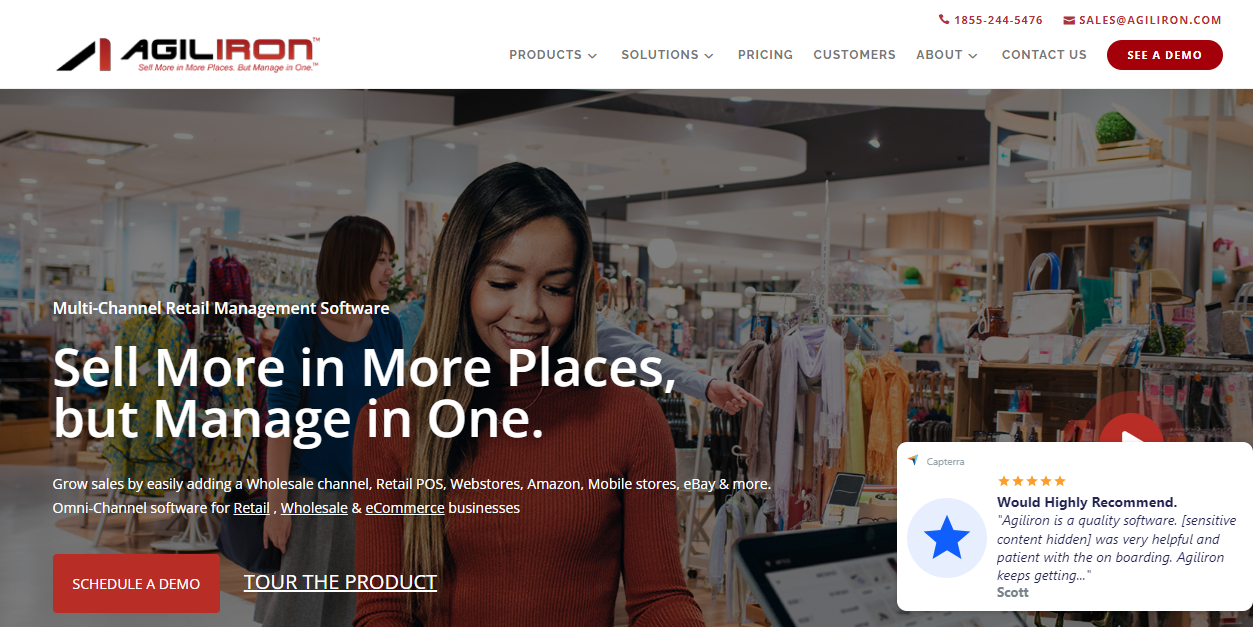
A multichannel inventory management software, Agiliron serves multiple types of businesses including eCommerce, retail, social commerce, and retail.
This inventory management software ensures information is not isolated, so you can find out what you need. The channel inventory management system offers comprehensive B2C and B2B inventory features. You can create custom orders, assemblies, substitutions, and matrixed products.
The inventory software integrates with Amazon and eBay. Centralized inventory tracking with online learning centers with videos makes it easy to use. You can create purchase orders and assign them to salespeople.
Features
- Real-Time Inventory Tracking
- Barcode Scanning
- Multi-Channel Selling
- Inventory Reports
- Cloud-Based Inventory Management Software
- Payment Gateways
- Accounting Software Integration
- Low-Stock Alerts
- Supply Chain Management
- Expiration Dates Tracking
Top 3 Features of Agiliron
1. Real-Time Inventory Tracking
Agiliron’s real-time inventory tracking is essential for any small business owner. Keeping track of your stock levels in real-time enables you to make informed decisions promptly. This can help prevent stockouts and reduce excess inventory, ultimately increasing customer satisfaction.
2. Low-Stock Alerts
For a small business owner, maintaining optimal stock levels is critical. Agiliron's low-stock alert feature notifies you whenever an item's stock reaches a predetermined level. This timely information enables you to make quick purchasing decisions, ensuring that you never run out of essential items.
3. Multi-Channel Selling
Agiliron excels in supporting multi-channel selling, making it ideal for eCommerce businesses. This feature allows you to manage your inventory across various online platforms easily. Business owners can focus on expanding their reach while Agiliron takes care of the complex inventory processes.
Pros
- Real-time inventory tracking empowers business owners with instant stock level updates.
- Barcode scanning offers an efficient system for managing inventory items.
- Robust inventory reports support data-driven decisions.
- Multi-channel selling capabilities make it suitable for eCommerce businesses.
- The cloud-based inventory management software ensures seamless scalability.
Cons
- The software may be overwhelming due to its advanced inventory features.
- Limited customer support options may hinder business operations during emergencies.
- An expensive plan can be a major drawback for budget-conscious small businesses.
- Not all accounting software options may be compatible.
- The feature-rich interface may require a steep learning curve for some business owners.
Pricing
- Enterprise plan starts at $169 per /month
- Global enterprise plan starts at $255 per month.
Conclusion
Agiliron is a comprehensive software solution providing a range of advanced inventory management features for small businesses. Its real-time tracking and multi-channel selling are strong points, but the cost and learning curve could be deterrents.
Comparing Small Business Inventory Management Software
|
Features |
ZarMoney |
Zoho Inventory |
InFlow Inventory |
Ordoro Inventory |
Cin7 Inventory |
LightSpeed |
BrightPearl |
NetSuite |
Agiliron |
|
Real-Time Tracking |
✅ |
✅ |
✅ |
✅ |
✅ |
✅ |
✅ |
✅ |
✅ |
|
Barcode Scanning |
✅ |
✅ |
✅ |
✅ |
✅ |
❌ |
✅ |
✅ |
✅ |
|
Multi-Channel Selling |
✅ |
✅ |
❌ |
✅ |
✅ |
✅ |
✅ |
✅ |
❌ |
|
Accounting Integration |
✅ |
✅ |
✅ |
✅ |
❌ |
✅ |
✅ |
✅ |
✅ |
|
Cloud-Based |
✅ |
✅ |
✅ |
✅ |
❌ |
✅ |
✅ |
❌ |
✅ |
|
Low-Stock Alerts |
✅ |
❌ |
✅ |
✅ |
✅ |
✅ |
✅ |
❌ |
✅ |
|
Payment Gateways |
✅ |
❌ |
❌ |
✅ |
✅ |
✅ |
✅ |
✅ |
✅ |
|
Supply Chain Management |
✅ |
❌ |
❌ |
✅ |
✅ |
❌ |
✅ |
✅ |
✅ |
|
Customizable Reports |
✅ |
✅ |
✅ |
✅ |
✅ |
❌ |
❌ |
✅ |
✅ |
|
Integration with eCommerce |
✅ |
✅ |
❌ |
✅ |
✅ |
✅ |
❌ |
✅ |
✅ |
Best of the Best
1. ZarMoney
Taking the top spot is ZarMoney, an all-in-one solution for small businesses. Its real-time inventory tracking and barcode scanning capabilities set it apart from competitors. The cloud-based inventory management software ensures that business owners can access data from anywhere. Unlimited users and advanced inventory features make it a versatile tool for any small business.
2. Zoho Inventory
Zoho Inventory stands as a robust software solution with a wide range of inventory management features. It excels in multi-channel selling and provides an array of accounting software integrations. Real-time inventory tracking and an intuitive interface make it user-friendly, yet powerful for small business owners.
3. InFlow Inventory
InFlow Inventory is a formidable contender, offering small businesses an intuitive interface and robust features like real-time inventory tracking. Its low-stock alerts and detailed reports make it a reliable tool for business owners keen on making data-driven decisions. Its seamless accounting software integration provides an added layer of convenience.
Final Verdict
From basic inventory management software with key features to more advanced systems, the goal is to equip business owners with the necessary tools for success. The choice is yours, but remember, effective inventory management is a cornerstone in the foundation of a prosperous business.
Frequently Asked Questions (FAQs)
1. How do real-time inventory systems work?
Real-time systems provide immediate data on stock levels, enabling quick, informed decisions. These systems often use cloud-based technology for up-to-the-minute accuracy.
2. What protocols are commonly used for barcode scanning?
Most Inventory Management Software supports UPC, EAN, and QR codes, among others, for comprehensive inventory items tracking.
3. Can I set varying low-stock alert levels for different products?
Yes, most advanced inventory features allow customization of low-stock alerts based on product type or significance.
4. How do inventory management platforms integrate with accounting software?
Through API connections or built-in features, inventory software can synchronize data like purchase orders and invoices with your accounting systems.
5. What encryption methods are generally used in cloud-based inventory management software?
Typically, SSL/TLS encryption methods are used to secure data transfers in cloud-based inventory management solutions.
6. How can I choose the right plan for my business?
Evaluate your needs and budget, and look for a plan that offers the key features you require without overwhelming you with unneeded functionalities..
7. How does multi-warehouse management work?
Multi-warehouse management allows tracking of inventory quantities across different locations, often supporting real-time data synchronization.
8. What are the essential KPIs that inventory reports should include?
Critical KPIs often include turnover rates, stock-to-sales ratios, and carrying costs, essential for making data-driven decisions.
9. How do expiration dates tracking features function?
Some advanced systems allow for batch tracking and FIFO methods to monitor expiration dates and minimize waste.
10. Can I manage serialized inventory with these platforms?
Yes, some advanced inventory features in these tools offer serial number tracking for individual inventory items, facilitating warranty claims and quality control.

